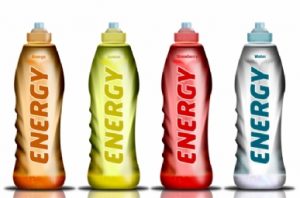By Mariia Khanenko [1]

Photo by A Word On Nutrition
BELLEVILLE – The campus nurse at Loyalist College says the rush students get from caffeine energy drinks is illusory.
Lauren Deans was reacting to the Canadian Paediatrician’s Society (CPS) position statement [2] released earlier this week warning of the effects of caffeine and sugar- based substances in sports and caffeine energy drinks .
They make you feel full of energy, ready to do anything said Deans. You get the energy from extra caffeine and sugar, it buzzes your body, you feel hocked up but “it’s not your normal body doing the exercise.”
There is an illusion of extra energy in your body, you feel like you can lift more, run longer, push harder but after “caffeine wears down, glucose (from sugar) is gone and you are looking at a huge crush.”
In fact, in a bottle of an energy drink there are 400 milligrams of caffeine, when in a regular cup of coffee there are only 150 milligrams of caffeine.
It’s common for students to consume sports or energy drinks (CED) before or during the workouts.
Energy drinks can also cause sleeping problems and anxiety.
“You become hyper, your heart starts beating faster, all of a sudden you feel frighten”, Deans said.
In the position statement, the paediatric society says “the combination of CED’s mixed with alcohol has been associated with an increase in risk-taking behaviours and harmful incidents. Students who reported this practice were also found to be at higher risk of experiencing alcohol-related consequences, including being sexually assaulted or sexually assaulting others, driving with an intoxicated driver, being physically hurt or injured, and requiring medical treatment. A survey of university students in Canada also found a significant association between the mixing of CEDs with alcohol and risk-taking behaviours, including the use of cocaine, crack-cocaine, amphetamines or crystal meth within the previous 12 months.”
“Energy drinks should not be used as a fluid replacement. Because of their caffeine content, they can actually mask the sighs of dehydration,” says on the Health Canada website. “It (CED) just going to stimulate your kidneys to release more water and you letting out more then you drink,” said Deans.
Kerry Donnell from Hastings and Prince Edward District School Board said in most schools there no more sports and energy drinks on sale.
“Water is really encouraged at schools. Where drinks are available for sales, water is a preferred choice,” Donnell said.
Sports drinks are an option but not a necessity to stay hydrated during the training, according to Cody Mestre, Loyalist’s recreation & fitness facilities coordinator.
“Most people don’t need them (sports drinks), athletes or not.” said Mestre.